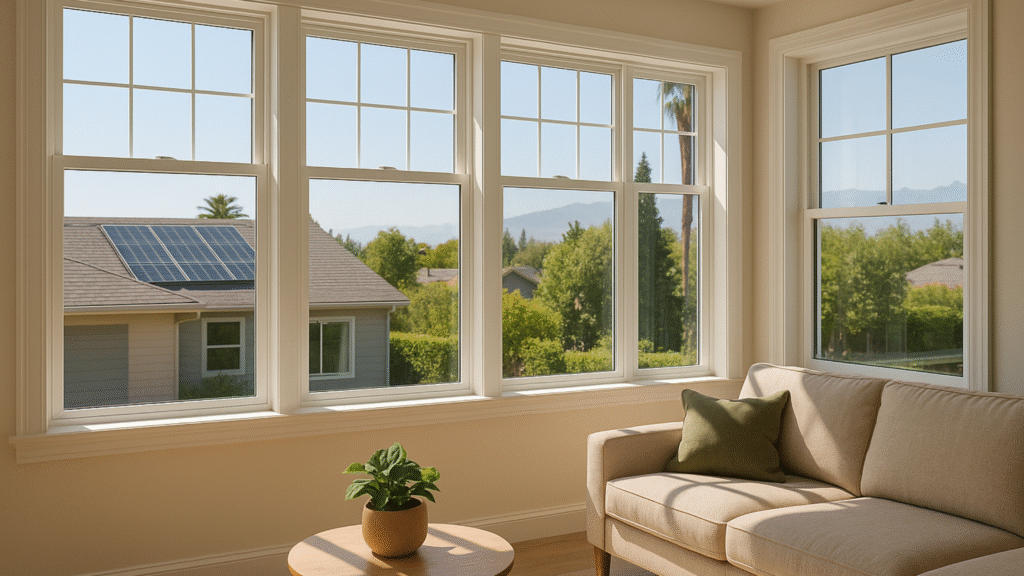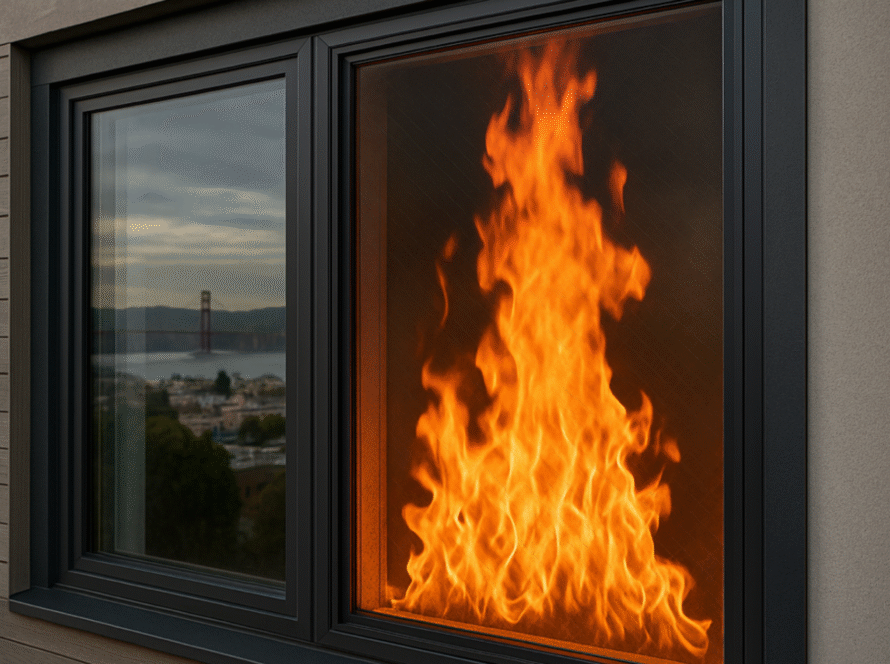
Selecting the most energy efficient windows maximizes solar investment returns by optimizing thermal performance and energy balance in San Jose’s unique climate conditions.
Maximizing Solar Investment Through Strategic Window Selection
San Jose homeowners with solar installations require specialized window solutions that complement renewable energy systems while delivering exceptional thermal performance. The most energy-efficient windows work synergistically with solar panels to create comprehensive energy management systems that reduce utility dependence.
Understanding how window selection affects solar efficiency helps homeowners make informed decisions that maximize the benefits of both technologies. Energy Star-certified windows with optimized solar heat gain coefficient ratings prevent energy waste while supporting grid-tie efficiency goals.
A professional window consultation ensures the proper integration between solar systems and window performance, creating homes that generate clean energy while maintaining optimal indoor comfort year-round.
Understanding Solar Heat Gain Coefficient and Window Performance
SHGC Optimization for Solar Homes
Solar heat gain coefficient SHGC ratings determine how much solar energy passes through windows, directly impacting heating and cooling loads in solar-equipped homes. San Jose’s climate requires a careful balance of SHGC to support winter heating while preventing summer overheating.
Optimal SHGC considerations for solar homes:
- South-facing windows benefit from moderate SHGC values for winter heat gain
- West-facing installations require lower SHGC ratings to reduce afternoon heat buildup
- North-facing windows prioritize thermal insulation over solar gain
- East-facing orientations balance morning light with heat control
Energy-efficient windows with properly selected SHGC ratings work with solar systems to reduce heat gained from unwanted sources while maximizing beneficial solar contributions during appropriate seasons.
Thermal Performance Integration
Triple-pane glass systems provide superior thermal performance that complements solar energy generation by minimizing heat transfer through window assemblies. This reduced heat loss maintains comfortable indoor temperatures using less energy from either solar or grid sources.
Advanced thermal features include:
- Triple pane window construction with insulating gas fills
- Warm edge spacers that reduce thermal bridging
- Low-E coatings that control radiant heat transfer
- Insulated frame materials that eliminate conductive heat loss
These features work together to create window systems that support solar energy goals while providing exceptional comfort and efficiency performance.
Window Orientation and Energy Balance Strategies
Directional Optimization Techniques
Window orientation optimization maximizes solar home efficiency by balancing natural light, heat gain, and energy consumption across different building exposures. San Jose’s sun patterns require specific strategies for each cardinal direction.
South-facing window strategies:
- Moderate SHGC values capture beneficial winter solar heat gain
- Overhang design prevents excessive summer heat penetration
- High visible light transmission maximizes natural illumination
- Energy-efficient glass reduces unwanted heat transfer
East and west exposures require different approaches to manage intense morning and afternoon sun angles that can overwhelm cooling systems and reduce solar efficiency.
Seasonal Energy Balance Considerations
Energy balance considerations account for San Jose’s seasonal variations that affect both solar generation and window performance throughout the year. Optimal window selection supports consistent energy efficiency across changing weather patterns.
Winter optimization priorities:
- Reduced heat loss through advanced glazing systems
- Beneficial solar heat gain during low-angle sun periods
- Minimal air infiltration that wastes heated air
- UV protection that prevents interior fading
Summer strategies focus on controlling heat gained while maintaining natural light levels that reduce artificial lighting demands on solar systems.
Advanced Glass Technologies for Solar Integration
Smart Glass Technology Applications
Innovative glass technology provides dynamic control over window properties, allowing them to adapt to changing solar conditions and energy demands. These systems integrate with home automation to optimize both solar generation and window performance automatically.
Smart glass benefits for solar homes:
- Automatic SHGC adjustment based on outdoor conditions
- Integration with solar monitoring systems for optimal balance
- Reduced cooling loads that maximize solar energy available for other uses
- Enhanced privacy and glare control without sacrificing energy efficiency
Advanced control systems coordinate the operation of smart glass with solar generation patterns, creating responsive building envelopes that maximize energy independence.
High-Performance Glazing Systems
Triple-pane glass systems represent the pinnacle of window energy efficiency, providing thermal performance that supports aggressive energy independence goals. These systems reduce both heating and cooling demands that compete with other electrical loads in solar homes.
Premium glazing features:
- Multiple Low-E coating layers for precise solar control
- Argon or krypton gas fills for maximum insulation
- Structural glazing that eliminates thermal bridges
- Impact-resistant construction for enhanced durability
These technologies create window systems that perform optimally for decades, protecting long-term solar investment returns through consistent efficiency.
Frame Materials and Construction for Solar Homes
Thermal Bridge Elimination
Window frames significantly impact overall thermal performance through conductive heat transfer that can undermine both solar efficiency and comfort. Advanced frame materials prevent thermal bridging while supporting high-performance glazing systems.
Superior frame material options:
- Fiberglass construction with insulated cavities
- Vinyl frames with multi-chamber designs
- Composite materials that combine strength with insulation
- Thermally broken aluminum for commercial applications
These frame technologies ensure that efficient windows maintain their thermal performance ratings in real-world installations where temperature differentials stress conventional materials.
Integration with Solar Architecture
Frame materials must complement solar home architecture while providing structural support for advanced glazing systems. San Jose’s seismic considerations require robust construction that maintains energy efficiency under dynamic loading conditions.
Architectural integration factors:
- Color coordination with solar panel installations
- Structural compatibility with photovoltaic mounting systems
- Weather resistance for long-term performance
- Maintenance requirements that align with solar system service needs
Professional installation ensures proper integration between window systems and solar infrastructure while maintaining both aesthetic appeal and functional performance.
Protecting Solar Investment Through Window Selection
UV Protection and System Longevity
Harmful UV rays affect both interior furnishings and solar system components, making UV-protective windows essential for comprehensive solar home design. Energy-efficient windows filter damaging radiation while maintaining beneficial natural light.
UV protection benefits:
- Interior furnishing protection that maintains home value
- Reduced fading of solar system components exposed through windows
- Enhanced occupant comfort through glare reduction
- Maintained solar panel efficiency by reducing interior heat buildup
Advanced Low-E coatings offer selective UV filtering, protecting investments while supporting energy efficiency goals.
Grid-Tie Efficiency Optimization
Grid-tie efficiency depends on minimizing energy consumption that competes with solar generation, making window efficiency critical for maximizing export credits and energy independence. The most energy-efficient windows reduce HVAC loads that would otherwise consume solar production.
Efficiency optimization strategies:
- Minimized air infiltration that wastes conditioned air
- Optimal solar heat gain coefficient for reduced cooling demands
- Enhanced insulation that reduces heating requirements
- Natural ventilation capabilities that reduce mechanical system usage
These features ensure that solar generation exceeds consumption, resulting in a positive energy balance that supports both financial returns and environmental goals.
Professional Installation for Maximum Solar Integration
System Coordination Requirements
Professional installation ensures proper coordination between window systems and existing solar infrastructure. Experienced contractors understand how window performance affects solar efficiency and overall energy balance.
Installation considerations for solar homes:
- Coordination with existing solar mounting systems
- Integration with home automation and monitoring systems
- Proper sealing that maintains building envelope integrity
- Structural support that accommodates high-performance glazing
Expert installation maximizes both window and solar system performance while ensuring long-term reliability and efficiency.
Performance Verification and Optimization
Post-installation verification confirms that window systems deliver expected thermal performance and solar integration benefits. Professional contractors provide performance testing that validates efficiency improvements and identifies optimization opportunities.
Verification services include:
- Thermal imaging to confirm proper installation
- Air leakage testing to ensure envelope integrity
- Solar heat gain measurement under various conditions
- Integration testing with existing solar monitoring systems
These services ensure that window investments deliver promised benefits while supporting overall solar system performance goals.
Achieving Maximum Energy Independence
Selecting the most energy-efficient windows creates synergistic benefits with solar installations, maximizing energy independence and environmental sustainability. Strategic window selection reduces energy consumption while optimizing solar gain patterns that support year-round comfort.
Focus on window systems that provide exceptional thermal performance while integrating seamlessly with solar energy generation. Professional consultation ensures optimal selection for San Jose’s climate while supporting long-term efficiency and financial goals.
The combination of advanced glazing technology, optimized orientation strategies, and professional installation creates window systems that enhance solar investment returns for decades.
Maximize energy efficiency with solar-friendly windows – talk to a Bay Area window expert today to optimize your solar investment through strategic window selection that delivers superior thermal performance and energy independence.
Since 1987, Insight Glass has provided top-quality windows & patio doors in the Bay Area.
Call 707-746-6571 for Expert Installation!
CONTACT US TO GET A FREE ESTIMATE!


